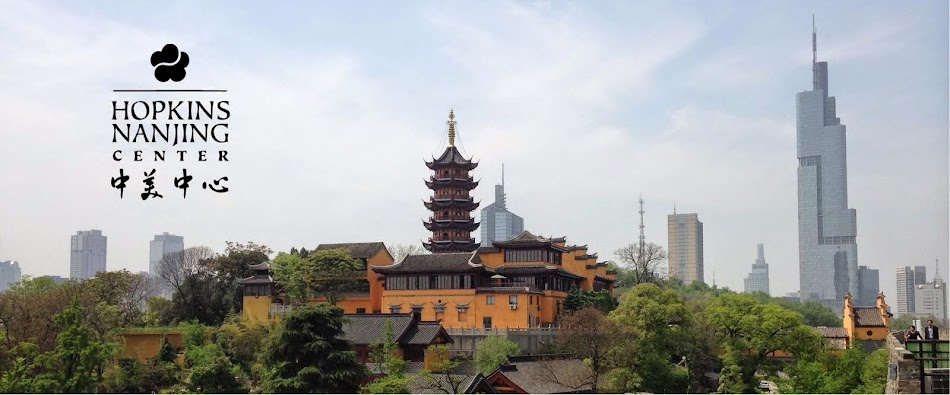The Hopkins-Nanjing Center's 30th Anniversary Celebration kicked off on June 17 with commencement at the HNC. Congratulations to to the class of 2016!
The commencement ceremony featured keynote remarks by Lisa Heller, Acting Deputy Chief of Mission and Minister Counselor for Public Affairs at the U.S. Embassy in Beijing, and Zhou Wei, Deputy Director-General at the Jiangsu Province Foreign Affairs Office. President of Nanjing University, Chen Jun and President of Johns Hopkins University, Ronald J. Daniels also made remarks to the class of 2016.
 |
| 2016 MAIS graduates |
 |
| Emily Shea, International Student Representative |
International student and MAIS graduate, Emily Shea, and Chinese student, Caixiao Chen were selected as student representatives. In the spirit of the HNC's bilingual community, student representatives delivered their addresses in their target languages. Below is the full transcript of Emily's speech.
尊敬的各位来宾、老师,亲爱的同学们,
大家好! 我叫沈琳,我是今年二年级硕士班的毕业生。
今天,我很荣幸能够代表2016届毕业生向培养我们的中美中心表示最诚挚的感谢!
这次的毕业典礼意义非凡,因为今年恰好是中美中心成立30周年。我很高兴能够在中心“三十而立”的时候为中心献上一份祝福,也很高兴与大家一起见证中心在经过三十年的努力和奋斗之后,达到了一个新的高度,即,在一个多元文化环境下,教育和培养来自中国、美国和其他国家的研究生,并对中美关系的发展和东西方之间的文化交流与传承产生深远的影响。
在此,我谨代表2016届全体毕业生,感谢中美中心对我们的教育和培养,感谢各位领导和老师对我们的关爱和教诲,感谢家人对我们的支持和鼓励,感谢身边朋友给我们带来的快乐和帮助。
每当回想起我们这一年来的丰富多彩的活动,我就为自己能成为2016届毕业生的一份子而感到无比幸运。
 |
| Johns Hopkins University President Ronald J. Daniels presenting graduation certificates |
你们具有很强学习能力和逻辑思维能力, 你们会用多种语言讨论你们所关心的话题;
你们不惧任何挑战,不断勇往直前;
最重要的是,你们懂得如何去充分享受生活,是你们,让中美中心充满了美好的回忆和快乐的时光。
 |
| Nanjing University President Chen Jun presenting graduate certificates |
我相信,像这样一群优秀的毕业生,一定会给我们这个世界带来积极的影响。
同学们,我们都是富有才华、潜力无限的人。中心赋予我们最宝贵的财富之一就是,她将我们紧紧地聚在了一起,让我们之间情谊的纽带得以建立。无论是对世界各国的和平发展,还是对我们个人未来的幸福生活而言,这种纽带都弥足珍贵。
 |
| Emily Shea with her fellow MAIS graduates |
也许在今天毕业之后,我们就要各奔东西。我希望大家不要因为今日的离别而感到悲伤。因为今天,我们只是和我们中心的学习生活告别,而不是和各位同窗的永别。就我个人来说,我对未来充满了期待。因为我一直在想,我们未来会在什么时候,会在哪里重逢?是在上海,还是在华盛顿?或者是在巴黎,一边喝咖啡一边回忆往事?或者是在东京,一边喝红酒一边谈论我们各自的事业和家庭?国际关系专业的学生拥有的一定是国际性的友谊!我坚信,当中美中心庆祝成立60周年的时候,我们仍然会发现,我们的跨国友谊和彼此的国际职业生涯,都仍在传承中心的精神,并将这种精神发扬光大。
Photos courtesy of Carl McLarty
Photos courtesy of Carl McLarty






